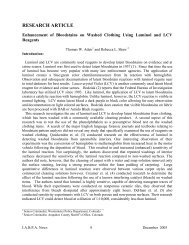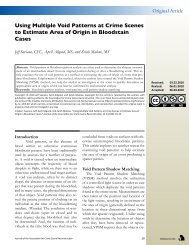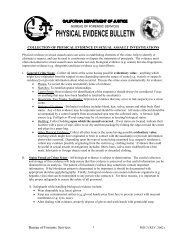Free Web-Based Services May Cost More Than - Crime Scene ...
Free Web-Based Services May Cost More Than - Crime Scene ...
Free Web-Based Services May Cost More Than - Crime Scene ...
You also want an ePaper? Increase the reach of your titles
YUMPU automatically turns print PDFs into web optimized ePapers that Google loves.
<strong>Free</strong> <strong>Web</strong>-<strong>Based</strong> <strong>Services</strong> <strong>May</strong> <strong>Cost</strong> <strong>More</strong> <strong>Than</strong> Nothing:<br />
What You Might Not Know, They Just Might Know About You<br />
Robert B. Fried, BS, MS<br />
The Twentieth Century will inevitably bring with it an enormous surge of<br />
technological innovations. Today, as the world’s technology sector continues to expand,<br />
more and more people are compelled to become involved. The Internet, specifically, the<br />
World Wide <strong>Web</strong>, provides a medium in which the average individual can experiment<br />
with the benefits associated with the emerging computerized society we are in the midst<br />
of developing.<br />
Within the last five years, both the growth and usage of the Internet has expanded at<br />
an enormous rate. It can be safe to assume that the Internet and the terms associated with<br />
it are becoming a part of the vernacular. Unless you have been living under a rock or<br />
have been the unfortunate owner of a “dinosaur,” the term used to describe an old and<br />
antiquated personal computer, you have probably come into some contact with the<br />
Internet. Whether you’ve been exposed to it or not is a totally different issue.<br />
As public usage of the Internet continues to expand, many new Internet based services<br />
are in need of development and at a price the average user can afford. Recently, there<br />
have been numerous amounts of Internet-related companies providing such services at a<br />
price the average user could and would not refuse: for free.<br />
The truth is that many new “free” Internet-based or related services are becoming and<br />
will become more widely available. Some may view such services as a means of making<br />
life in this emerging Technological Era a little more convenient. Many of the “free”
services available today seem to do just that. <strong>Services</strong> which amount to such things as<br />
free electronic mail addresses, retrieval of music from musical recording artists, Internet<br />
based phone calls, newsgroups, Instant Messenger services, electronic greeting cards<br />
for any occasion, web based anti-virus programs, virtual hard disk space through storage<br />
on a server provided by a commercial website, and even as far as free Internet access<br />
through a direct dial-up connection using a conventional modem are all quite appealing.<br />
This may all seem phenomenal to the average individual. However, to the<br />
experienced and rather savvy Internet user, these “free” services are somewhat sketchy.<br />
The experienced computer user would know that the Internet was originally designed to<br />
mainly cater to government agencies and academic institutions. Now with the advent of<br />
graphical browsers, the Internet has become easier to navigate and has rapidly developed<br />
into a commercial enterprise. 1<br />
I am a true believer of the coined phrase, “there is no such thing as a free lunch.” The<br />
intent of this paper is to examine some of the many emerging “free” Internet based<br />
services. My primary focus is to specifically evaluate and determine the true cost of such<br />
services to their users. Furthermore, I am interested in investigating how the companies<br />
providing such services ultimately profit. <strong>More</strong>over, I am interested to learn whether or<br />
not such companies have hidden agendas that their users don’t exactly know about.<br />
In order to begin to examine the true nature of Internet related services, it is important<br />
to understand why they have rapidly gained an enormous amount of popularity.<br />
Rebecca Winters a columnist for Time Digital gives some insight as to why “free”<br />
Internet access has become popular. Winters states, “the chief lure of these offerings:<br />
1 Kenworthy, Karen. (1998, September). Cookie Crumbs. Windows Magazine [Online]. Available:<br />
http://www.winmag.com/Karen. [2000, July 26].
annual savings of up to $300, compared with that you would pay for America Online,<br />
Earthlink or other fee-based services. And they come with a solid array of baseline<br />
services: unlimited surfing time, e-mail, personalized start pages, calendars, chat services,<br />
shopping, news, sports and stock links. That should be enough stuff to get even your<br />
stingy Aunt Mae online to see your new baby photos.” 2 In his article entitled “Cheap<br />
Shots,” Matthew Schwarz, a columnist for Computerworld adds that in a study conducted<br />
in November 1999, “Jupiter Communications Inc. in New York found that 23% of<br />
customers said they would be interested in free online access in return for viewing<br />
advertising and letting their buying patterns be tracked. But 16% said they would rather<br />
pay $5 per month to their Internet service provider in exchange for not viewing<br />
advertising.” 3 It seems like quite the bargain. Most everyone would want to save money<br />
wherever they could in this day and age. The Internet is just another expense and if it’s<br />
offered for free by some, why not grab it?<br />
The truth is many people have signed up to receive “free” Internet service. Winters,<br />
in her column of Time Digital entitled, “<strong>Free</strong> Economy” provides some astounding<br />
statistics. In her research on the subject, she learned that, “according to Jupiter<br />
Communications, free-access providers are used by 7% to 8% of US households<br />
connected to the Net.” “Jupiter expects that number to jump to 13% by 2003.” Millions<br />
of people have signing onto services such as NetZero, Juno, Excite@Home, BlueLight<br />
and the number continues to grow each day. 4 How can these companies handle such<br />
enormous growth? Software needs to be written to allow users to allow users to sign on<br />
2 Winters, Rebecca. <strong>Free</strong> Economy: Internet Service Providers. Time Digital [Online]. Available:<br />
http://www.time.com/time/digital/reports/free/isp.html. [2000, July 26].<br />
3 Schwartz, Matthew. (2000, 03 Jul). Cheap Shots. Computerworld, 60-61.
and have the programs needed to run such a service resident on their computers hard disk<br />
drive, telephone numbers need to be bought and maintained so that users can access the<br />
service, severs have to be purchased so that direct access to the Internet can be provided,<br />
facilities need to be established to house such computer hardware and staff need to be<br />
hired to handle the operations, customer service, and technical support that will inevitably<br />
be necessary when dealing with computers and the public. There has got to be a catch<br />
somewhere. It just doesn’t make sense that these services are deemed totally “free”.<br />
So what do these companies giving “free” Internet access gain by providing such a<br />
service? As Rebecca Winters’ research points out, these companies receive a whole lot<br />
of information and marketing strategies. Essentially, “when you sign up, you typically<br />
fill out forms that give the provider a wealth of information about you and your spending<br />
habits. Armed with your answers, the service providers match you up with the<br />
appropriate ads.” 5 Is this where these companies make their profit? With these “free”<br />
online services come banners and advertisements appearing across the screen, many of<br />
which cannot be minimized, closed, or moved. If no sort of advertisement is floating<br />
across the user’s screen, then there is usually another tactic that is implemented.<br />
Information can also be collected about the user through monitoring the web sites the<br />
user connects to. DoubleClick is one such company that monitors a user’s traffic patterns<br />
online. Essentially, “DoubleClick is able to follow users online because it operates an ad<br />
network that serves millions of ads across the Internet. Every ad includes a small<br />
4 Winters, Rebecca. <strong>Free</strong> Economy: Internet Service Providers. Time Digital [Online]. Available:<br />
http://www.time.com/time/digital/reports/free/isp.html. [2000, July 26].<br />
5 Winters, Rebecca. <strong>Free</strong> Economy: Internet Service Providers. Time Digital [Online]. Available:<br />
http://www.time.com/time/digital/reports/free/isp.html. [2000, July 26].
“cookie” that tags the computer and Internet connection.” 6 Through the monitoring of a<br />
user’s behavior on the Internet one can learn about their interests and desires. Emails and<br />
advertisements can then be sent to that particular user via email or postal mail that had<br />
been provided at the time when the “free” account was initially established. These<br />
methods of retrieving information about a particular user are quite clever. However, are<br />
companies providing such services and displaying these personalized ads, in a sense<br />
invading someone’s right to privacy?<br />
In order to evaluate whether an individual’s privacy is being invaded through the<br />
usage of such services, it is essential to examine how information about a particular user<br />
is obtained while online. One such way, which has become a common practice as noted<br />
previously with DoubleClick, is to place “cookies” onto a user’s computer. One may<br />
confuse these with the cookies bought at the local bakery. However, as we have begun to<br />
realize, computer jargon does not always refer to the obvious.<br />
A cookie is essentially, “a small piece of information (comprising no mother than 255<br />
characters and 4k of disk space), written to the hard drive of an Internet user when he or<br />
she visits a website that offers cookies. Cookies can contain a variety of information,<br />
including the name of the website that issued them, where on the site the user visited,<br />
passwords, and even user names and credit card numbers that have been supplied via<br />
forms. Cookies are supposedly only retrievable by the site which issued them, and link<br />
the information gathered to a unique ID number assigned to the cookie so that<br />
information is available from one session to another.” 7 So it is apparent that cookies can<br />
6 Wice, Nathaniel. (2000, February 02). Advocates Declare Privacy War Against DoubleClick. Time<br />
Digital [Online]. Available: http://www.time.com/time/digital/daily/0,2822,38568,00.html. [2000, July 26].<br />
7 Elchelberger M.L.I.S, Lori. The Cookie Controversy: Introduction. Available:<br />
http://www.cookiescentral.com/ccstory/index.htm [2000, July 26].
e somewhat beneficial to creators or owners of web sites. However, cookies are being<br />
used more and more by Internet advertising agencies such as DoubleClick and their<br />
increasing usage is worrying proponents of electronic privacy.<br />
<strong>Web</strong> cookies have been around since 1994, when Lou Montulli of Netscape initially<br />
designed them for use with the Netscape Navigator 1.0 web browser. 8 They were<br />
initially designed to enhance the online shopping experience. Now new variations of<br />
cookies have developed which go beyond what they initially intended to do. One such<br />
type of cookie is known as the stealth cookie. Essentially, “stealth cookies are hidden by<br />
third parties on web pages (you visit a page and get tagged by cookies from sites you<br />
never visited) or security holes (Internet Explorer has one) that will allow third parties to<br />
see your cookies.” 9 Furthermore, now, “with the proper cookie scheme web site<br />
developers can tell which demographic group goes where, and how many people are<br />
interested in a particular product or service.” If designed correctly, a web cookie can<br />
even determine the popularity of a certain ad or other marketing device appearing on a<br />
web site. 10 It’s no wonder why so many businesses are using cookies these days. The<br />
question that concerns many is how are the users of such services protected from<br />
unwanted cookies? Does the information that however, is collected, get misused?<br />
Furthermore, do the customers read policy statements and recognize some of the<br />
associated drawbacks prior to signing on to such services?<br />
8<br />
Whalen, David. The Official Cookie FAQ: version 2.53. Available: http://www.cookiecentral.com/faq..<br />
[2000, July 27].<br />
9<br />
Dowell, William. (2000, June 15). The Cookie Jar (a.k.a. Your Computer) Time Digital [Online].<br />
Available: http://www.time.com/time/digital/daily/0,2822,47451,00.html. [2000, July 26].<br />
10<br />
Elchelberger M.L.I.S, Lori. The Cookie Controversy: Introduction. Available:<br />
http://www.cookiescentral.com/ccstory/index.htm [2000, July 26].
Many new software packages and prevention techniques are now widely available to<br />
help users of such services from receiving unwanted and often hidden cookies. However,<br />
many companies who design cookies often do not provide any assistance in regards of<br />
deleting them from a system. Marc Slayton, a columnist for <strong>Web</strong>monkey suggests users<br />
take the following actions to try and avoid their computer from essentially becoming a<br />
cookie jar. He suggests that users learn about their web browser options to see if there<br />
are any options in regards to the acceptance or denial of cookies onto a system’s hard<br />
disk drive. Furthermore, Slayton suggests that user’s designate a specific region of their<br />
hard drive to store cookies as unreadable. <strong>More</strong>over, Slayton recommends that users<br />
utilize sites that have an anonymous account when one logs into a password-protected<br />
section of the web site. 11<br />
The issue over misuse of information obtained from cookies was and continually is a<br />
big concern of the Internet Engineering Task Force. The I.E.T.F. set forth guidelines<br />
they felt reasonable in regards to web sites issuing web cookies to their users. In their<br />
proposal RFC 2109, the I.E.T.F. proposed controls on how cookies can be set and<br />
transferred to a user’s hard disk drive. The proposal was not designed to totally eliminate<br />
web cookies; it attempts to fix some of the problems (privacy and such) associated with<br />
their usage. Since, many web sites do not provide much assistance in the area of deleting<br />
web cookies, RFC 2109 proposed ways in which companies designing web-browsing<br />
software can implement an automatic cookie rejection shortcut within the browser itself.<br />
Many <strong>Web</strong> designers are not too fond of having to redesign their software. The fact, that<br />
software companies feel this way is music to the heart of many web-based advertising<br />
11 Slayton, Marc. (1996, November). It Ain’t All Cookies and Cream. <strong>Web</strong>monkey [Online]. Available:<br />
http://www.media-awareness.ca/eng/issues/priv/resource/cookies.htm. [2000, July 27].
agencies. However, concerns coming from users of the Internet continue to grow and it<br />
seems as though they are often left in the dark with such issues. 12<br />
Being that DoubleClick has been deemed the Internet’s largest advertising agency,<br />
concern regarding the usage of the data they collect comes into question. William<br />
Dowell, a columnist for Time Digital gives some insight as to how these companies use<br />
the data they collect in his column “The Cookie Jar (a.k.a. Your Computer)”. He states,<br />
“Most companies couldn’t care less about the data they have on specific individuals. It’s<br />
the topography of contemporary culture that they ‘re really after.” He suggests, “the<br />
reason for compiling massive databases is “data mining,” a process that involves<br />
unleashing supercomputers on vast quantities of data to spot customer trends that might<br />
otherwise go unnoticed.” 13<br />
On the surface, companies like DoubleClick do not seem to be misusing the<br />
information they collect. However, the more they collect, the more desirable their data is<br />
to other companies who are looking to benefit from what the trends in the collected data<br />
may show. Many companies have recently sought to merge with DoubleClick. As a<br />
result, DoubleClick has been in the hot seat as people try to figure out why they are so<br />
valuable. In November 1999, DoubleClick had announced that it would be acquiring<br />
Abacus Direct. This immediately concerned advocates of Internet privacy such as the<br />
I.E.T.F. “Abacus Direct is a company which profiles 88 million households that use snail<br />
mail to buy merchandise from catalogs. The merger promised a wholesale linkup of<br />
Abacus’s address and phone numbers with the ID numbers on Internet cookies – once<br />
12 Elchelberger M.L.I.S, Lori. The Cookie Controversy: Privacy Issues. Available:<br />
http://www.cookiescentral.com/ccstory/cc4.htm [2000, July 26].<br />
13 Dowell, William. (2000, June 15). The Cookie Jar (a.k.a. Your Computer) Time Digital [Online].<br />
Available: http://www.time.com/time/digital/daily/0,2822,47451,00.html. [2000, July 26].
you’ve been tagged with a cookie a lot of other people are going to be aware of who you<br />
are, and where you’ve been.” 14 If this merger doesn’t infringe on an individual’s right to<br />
privacy I don’t know what does.<br />
For most people, having a little bit of their privacy exposed does not bother them. For<br />
the amount of money they save as compared to fee-based Internet access providers and<br />
services; they feel it is worthwhile. So, you have to give them your name, a phone<br />
number and maybe even a street address; and subject yourself to an overwhelming<br />
amount of advertisements. Most people feel that this way of connecting to the Internet is<br />
better than dishing out $300 for a year of connection with a fee-based service. Without<br />
advertisers investing in this medium, there would most likely be no such thing as a “free”<br />
Internet service provider. 15 Furthermore if the users to such services continue to sign on,<br />
these companies will continue to expand their influence on the way people surf the<br />
Internet.<br />
Personal Privacy may be one of the sacrifices of getting involved with “free” Internet<br />
services; however, there are several other tradeoffs. Among the other tradeoffs of using<br />
such services are the risks associated with their security and integrity. Furthermore, the<br />
users of such services may have to deal with the glitches that may occur while utilizing<br />
the service.<br />
The question then becomes, how safe is someone using a “free” Internet based<br />
service? The truth of the matter is that no matter what you do on the Internet you are<br />
never safe. Not only can your activities be traced while surfing the net, your exact<br />
14 Dowell, William. (2000, June 15). The Cookie Jar (a.k.a. Your Computer) Time Digital [Online].<br />
Available: http://www.time.com/time/digital/daily/0,2822,47451,00.html. [2000, July 26].<br />
15 Dowell, William. (2000, June 15). The Cookie Jar (a.k.a. Your Computer) Time Digital [Online].<br />
Available: http://www.time.com/time/digital/daily/0,2822,47451,00.html. [2000, July 26].
geographic location can be determined as well. Privacy.net, a consumer information<br />
organization reveals several other ways a user can be traced while using the Internet. A<br />
geographic location or the location of a computer that exists on a network can be<br />
determined by obtaining a user’s Internet Protocol address. It is the IP address (a series<br />
of specific and individualized numbers), which allows a user to connect onto the Internet.<br />
IP addresses are found in email messages, cookies, or even in software that allows for<br />
others to access your computer while it is on the Internet. 16<br />
Many people engaged in certain activities on the Internet try very hard to make their<br />
IP address invisible to other users. One such “free” Internet service that exposes the IP<br />
addresses of its users to hackers is Napster. Napster, a software program run via the<br />
Internet has become a medium in which a community of individuals interested in music,<br />
swap song files amongst themselves. This act violates copyright laws and many people<br />
in the music industry are willing to prosecute those engaging in such illegal acts. Having<br />
the IP addresses of such individuals brings the music industry one step closer to taking<br />
down Napster. So as anonymous as the users of Napster may think they are, an<br />
experienced computer user or hacker can find ways of determining the identity the users<br />
and what geographic locations they are connecting from. Eddie Kessler, a spokesman for<br />
Napster claims that the software will be analyzed to see how they can make it more<br />
secure. 17 However, the truth is if a professional or hacker has the will, they will always<br />
find a way to beat or disrupt security.<br />
16 “Being Traced Over the Internet”, http://www.internetprivacy.com/Traced/.<br />
17 Festa, Paul. (2000, January 26). Security Problem Discovered in Napster Music Software. CNET<br />
News.com [Online]. Available: http://news.cnet.com/news//0-1005-200-532962.html?tag=st.cn.sr.ne.1<br />
[2000, July 14]
Even when those companies who are believed to be most trusted offer, “free” Internet<br />
services there can still be problems. On July 12, 2000, it was reported that Microsoft’s<br />
“free” email service known as Hotmail experienced a “data spill”. According to<br />
Stephanie Olsen a staff writer for CNET, “data spills can occur when an HTML page<br />
contains an image, or GIF, that is served by a third party company such as an ad network.<br />
When the image is served, the web address, including any personal data, is sent to the<br />
third party so that ad network can know where to deliver the image” 18 Hotmail has nearly<br />
67 million subscribers, many of which subscribe to HTML newsletters. It is essentially<br />
through these newsletters that the data leak occurs. It is also important to note that this<br />
recent glitch with the email service is only one of several that Microsoft has “admitted”<br />
to the public. 19 Incidents such as this bring reality to the fact that even the most reputable<br />
of companies can sometimes not be fully trusted or safe.<br />
As can be seen, “free” online services, do in fact come with a price. They may<br />
not be collecting money, but they are surely collecting something. These online services<br />
are goldmines to the Internet based advertising agencies that fund them. It is amazing<br />
how much information can be collected on a user based on the web sites they visit or the<br />
online searches they do. Information that helps advertisers specifically cater to a user’s<br />
interests. One’s online activity often leads to the generation of advertisement banners<br />
that the user may find appealing. These marketing strategies are rather clever.<br />
As the number of subscribers to such services continues to grow many advertising<br />
agencies are beginning to see the potential of such a medium. So, these advertising<br />
18 Olsen, Stephanie. (2000, July 12). Hotmail Glitch Exposes Email Addresses. CNET News.com<br />
[Online]. Available http://news.cnet.com/news//0-1007-200-2247861.html?tag=st.cn.sr.ne.1 [2000, July 14]<br />
19 Olsen, Stephanie. (2000, July 12). Hotmail Glitch Exposes Email Addresses. CNET News.com<br />
[Online]. Available http://news.cnet.com/news//0-1007-200-2247861.html?tag=st.cn.sr.ne.1 [2000, July 14]
agencies decide to invest a little for the massive amounts of marketing information they<br />
will obtain in return. However, their desire to learn more about the users of the Internet<br />
may be going a step too far. The Internet user’s personal privacy and security are often<br />
sacrificed in return for utilizing the “free” services that are funded by such agencies.<br />
Who is to blame, the suppliers or subscribers of such services? Every body essentially<br />
benefits from this sort of arrangement. The advertisers obtain the information about the<br />
user that they want, and the user gets the service he or she craves. Although, the benefits<br />
to the user are obvious, the disadvantages aren’t always as clean cut.<br />
A majority of the users of such services aren’t always the most Internet savvy. They<br />
are generally those individuals who are more interested in getting something for nothing.<br />
Companies offering, “free” Internet services is often seen as a wish come true. <strong>More</strong><br />
often then not, it happens to be these individuals who neglect reading the privacy and<br />
security policies of the companies offering these “free” online services. Furthermore, it<br />
is often their lack of concern and familiarity with what they are ultimately getting<br />
themselves into which allows for them to be the most vulnerable.<br />
In an his article entitled “Cheap Shots,” Matthew Schwarz, quotes Timothy Hoffman,<br />
a psychotherapist and the director of Ambrosian Associates in Pastoral Counseling in<br />
Spencer, Massachusetts, who says it best when he states the following:<br />
“The drive to get Internet tools for free isn’t derived from some evolved sense of<br />
household budgeting; it’s innate. Its part of our animal instinct. It isn’t a question<br />
of morality. Its why Eve made that tragic mistake – the apple was hanging around<br />
for free. Really, it was just a survival instinct to grab it” 20<br />
20 Schwartz, Matthew. (2000, 03 Jul). Cheap Shots. Computerworld, 60-61.
Most people do just that and forget about the risks they take or the sacrifices they make<br />
when they get something in return for nothing.<br />
The issue of “free” online services and the risks and sacrifices to the users involved<br />
needs to be further researched. There is no question that some of the users of such<br />
services are sacrificing some of their personal privacy and security. Companies who<br />
offer such things, as “free” email, Internet access etc. should be further researched. They<br />
claim to only be collecting data for marketing their products and services. Are they<br />
telling the complete truth? How do the users of such services and even the users of the<br />
Internet in general know if the policy and security statements on the websites they view<br />
are being enforced?<br />
Questions such as these are of great concern. As a result, there has been a growing<br />
need for government intervention. In an attempt to help government recognize that the<br />
growing use of online profiling was an important issue to consider analyzing, officials of<br />
a popular periodical, Business Week spoke up on the issue. In a message to Congress,<br />
these officials stated:<br />
“… Who is going to hold DoubleClick – or any other data mining company – to the<br />
promises in their privacy policies? Most online companies insist that they can<br />
regulate themselves. <strong>May</strong>be. But as online direct marketing becomes more<br />
successful, the value of personal information will soar – as will the temptations to<br />
abuse it. Right now victims have no clear legal recourse… only the federal<br />
government can fill these shoes.” 21<br />
21 Network Advertising Initiative: Principles not Privacy, July 2000, July 2000,<br />
http://www.epic.org/privacy/internet/NAI_analysis.html.
In a verbal statement before a US Congress Committee, Fred Cohen, a premier leader<br />
in the world of computer forensics, investigations and vulnerabilities, offered some<br />
excellent insight. He stated, “The Internet today is an anarchy. Nobody is in charge,<br />
there are few rules, and almost no enforcement.” 22 In the real world, if a complaint<br />
against a business needs to be filed, one would know to contact the Better Business<br />
Bureau. However, in the virtual world, who is one to turn to when a complaint needs to<br />
be addressed? If proper legislation is proposed and passed in the near future, there may<br />
be reasonable answers to such questions.<br />
One of the problems with policing enforcing policies on the Internet is that there are<br />
millions of active websites and only a given amount of time in a day. Furthermore,<br />
because the Internet is expanding at an enormous rate it is becoming more difficult to<br />
keep track of what is truly occurring in Cyberspace.<br />
We must stop for a moment and face reality. The Internet has become a medium for<br />
exploitation of all sorts. With proper research comes further knowledge. The Internet is<br />
a valuable tool if used correctly. It needs to be beneficial to all who use it. Although, it<br />
has many obvious advantages, the risks associated with the Internet need to be brought<br />
out more into the light. Once the risks are exposed, awareness grows. With proper<br />
awareness, comes the ability to make better decisions.<br />
22 Verbal Statement of Fred Cohen, a world renowned computer forensics investigator, before a<br />
Congressional committee on serious cyber threats to the economic well being of the United States,<br />
http://fc@all.net/journal/vertbal.html.
Bibliography<br />
“Being Traced Over the Internet”, http://www.internetprivacy.com/Traced/.<br />
Cohen, Fred. Verbal statement before a U.S. Congressional committee:<br />
Serious Cyber Threats to the Economic Well Being of the United States.<br />
http://fc@all.net/journal/vertbal.html.<br />
Dowell, William. (2000, June 15). The Cookie Jar (a.k.a. Your Computer) Time Digital<br />
[Online]. Available: http://www.time.com/time/digital/daily/0,2822,47451,00.html.<br />
[2000, July 26].<br />
Elchelberger M.L.I.S, Lori. The Cookie Controversy: Introduction.<br />
Available: http://www.cookiescentral.com/ccstory/index.htm [2000, July 26].<br />
Elchelberger M.L.I.S, Lori. The Cookie Controversy: Privacy Issues.<br />
Available: http://www.cookiescentral.com/ccstory/cc4.htm [2000, July 26].<br />
Festa, Paul. (2000, January 26). Security Problem Discovered in Napster Music<br />
Software. CNET News.com [Online]. Available:<br />
http://news.cnet.com/news//0-1005 200-532962.html?tag=st.cn.sr.ne.1 [2000, July 14].<br />
Kenworthy, Karen. (1998, September). Cookie Crumbs. Windows Magazine [Online].<br />
Available: http://www.winmag.com/Karen. [2000, July 26].<br />
Network Advertising Initiative: Principles not Privacy, July 2000, July 2000,<br />
http://www.epic.org/privacy/internet/NAI_analysis.html.<br />
Olsen, Stephanie. (2000, July 12). Hotmail Glitch Exposes Email Addresses. CNET<br />
News.com [Online]. Available:<br />
http://news.cnet.com/news//0-1007-200-2247861.html?tag=st.cn.sr.ne.1 [2000, July 14].<br />
Schwartz, Matthew. (2000, 03 Jul). Cheap Shots. Computerworld, 60-61.
Slayton, Marc. (1996, November). It Ain’t All Cookies and Cream. <strong>Web</strong>monkey<br />
[Online]. Available: http://www.media-awareness.ca/eng/issues/priv/resource/cookies.htm.<br />
[2000, July 27].<br />
Whalen, David. The Official Cookie FAQ: version 2.53.<br />
Available: http://www.cookiecentral.com/faq. [2000, July 27].<br />
Wice, Nathaniel. (2000, February 02). Advocates Declare Privacy War Against<br />
DoubleClick. Time Digital [Online]. Available:<br />
http://www.time.com/time/digital/daily/0,2822,38568,00.html. [2000, July 26].<br />
Winters, Rebecca. <strong>Free</strong> Economy: Internet Service Providers. Time Digital [Online].<br />
Available: http://www.time.com/time/digital/reports/free/isp.html. [2000, July 26].
Footnotes<br />
1 Kenworthy, Karen. (1998, September). Cookie Crumbs. Windows Magazine [Online]. Available:<br />
http://www.winmag.com/Karen. [2000, July 26].<br />
2 Winters, Rebecca. <strong>Free</strong> Economy: Internet Service Providers. Time Digital [Online]. Available:<br />
http://www.time.com/time/digital/reports/free/isp.html. [2000, July 26].<br />
3 Schwartz, Matthew. (2000, 03 Jul). Cheap Shots. Computerworld, 60-61.<br />
4 Winters, Rebecca. <strong>Free</strong> Economy: Internet Service Providers. Time Digital [Online]. Available:<br />
http://www.time.com/time/digital/reports/free/isp.html. [2000, July 26].<br />
5 Winters, Rebecca. <strong>Free</strong> Economy: Internet Service Providers. Time Digital [Online]. Available:<br />
http://www.time.com/time/digital/reports/free/isp.html. [2000, July 26].<br />
6 Wice, Nathaniel. (2000, February 02). Advocates Declare Privacy War Against DoubleClick. Time<br />
Digital [Online]. Available: http://www.time.com/time/digital/daily/0,2822,38568,00.html. [2000, July 26].<br />
7 Elchelberger M.L.I.S, Lori. The Cookie Controversy: Introduction. Available:<br />
http://www.cookiescentral.com/ccstory/index.htm [2000, July 26].<br />
8 Whalen, David. The Official Cookie FAQ: version 2.53. Available: http://www.cookiecentral.com/faq..<br />
[2000, July 27].<br />
9 Dowell, William. (2000, June 15). The Cookie Jar (a.k.a. Your Computer) Time Digital [Online].<br />
Available: http://www.time.com/time/digital/daily/0,2822,47451,00.html. [2000, July 26].<br />
10 Elchelberger M.L.I.S, Lori. The Cookie Controversy: Introduction. Available:<br />
http://www.cookiescentral.com/ccstory/index.htm [2000, July 26].<br />
11 Slayton, Marc. (1996, November). It Ain’t All Cookies and Cream. <strong>Web</strong>monkey [Online]. Available:<br />
http://www.media-awareness.ca/eng/issues/priv/resource/cookies.htm. [2000, July 27].<br />
12 Elchelberger M.L.I.S, Lori. The Cookie Controversy: Privacy Issues. Available:<br />
http://www.cookiescentral.com/ccstory/cc4.htm [2000, July 26].<br />
13 Dowell, William. (2000, June 15). The Cookie Jar (a.k.a. Your Computer) Time Digital [Online].<br />
Available: http://www.time.com/time/digital/daily/0,2822,47451,00.html. [2000, July 26].<br />
14 Dowell, William. (2000, June 15). The Cookie Jar (a.k.a. Your Computer) Time Digital [Online].<br />
Available: http://www.time.com/time/digital/daily/0,2822,47451,00.html. [2000, July 26].<br />
15 Dowell, William. (2000, June 15). The Cookie Jar (a.k.a. Your Computer) Time Digital [Online].<br />
Available: http://www.time.com/time/digital/daily/0,2822,47451,00.html. [2000, July 26].<br />
16 “Being Traced Over the Internet”, http://www.internetprivacy.com/Traced/.<br />
17 Festa, Paul. (2000, January 26). Security Problem Discovered in Napster Music Software. CNET<br />
News.com [Online]. Available: http://news.cnet.com/news//0-1005-200-532962.html?tag=st.cn.sr.ne.1<br />
[2000, July 14]
18 Olsen, Stephanie. (2000, July 12). Hotmail Glitch Exposes Email Addresses. CNET News.com<br />
[Online]. Available http://news.cnet.com/news//0-1007-200-2247861.html?tag=st.cn.sr.ne.1 [2000, July 14]<br />
19 Olsen, Stephanie. (2000, July 12). Hotmail Glitch Exposes Email Addresses. CNET News.com<br />
[Online]. Available http://news.cnet.com/news//0-1007-200-2247861.html?tag=st.cn.sr.ne.1 [2000, July 14]<br />
20 Schwartz, Matthew. (2000, 03 Jul). Cheap Shots. Computerworld, 60-61.<br />
21 Network Advertising Initiative: Principles not Privacy, July 2000,<br />
July 2000, http://www.epic.org/privacy/internet/NAI_analysis.html.<br />
22 Verbal Statement of Fred Cohen, a world renowned computer forensics investigator, before a<br />
Congressional committee on serious cyber threats to the economic well being of the United States,<br />
http://fc@all.net/journal/vertbal.html.<br />
About the Author<br />
Robert Fried holds a B.S. and an M.S. in Forensic Science with a concentration in<br />
Advanced Investigation. He also holds Certificates in Law Enforcement Science,<br />
Forensic Computer Investigation, and Information Protection and Security from the<br />
University of New Haven and SEARCH. Fried has extensive knowledge of forensic<br />
science, however, most recently he has worked extensively in the developing field of<br />
"digital forensics" and has published in this area by organizations such as the SANS<br />
Institute. He is also a member of the NorthEast chapter of the High Technology <strong>Crime</strong><br />
Investigation Association (HTCIA).














